English Words in Action, Group R
(a variety of English words which have developed through history and are currently used in our modern age)
Simply click on this banner (or the following link) and you will be on your way to stimulate your brain for greater word comprehension with quizzes based on some of the words in this unit.
David's boss was rebuking him and his fellow workers for talking too much instead of completing their assignments.
2. Etymology: from Old French rebuchier, "to force back, to repress" from re-, "back, down" + buskier, "to beat" and before "to cut down wood."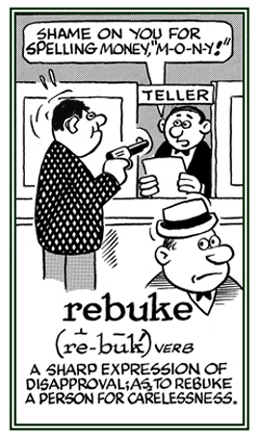
Go to this Word A Day Revisited Index
so you can see more of Mickey Bach's cartoons.
The claims about getting payoffs from construction companies were rebutted by the governor; however, political damage had been done.
The mayor said in a rebuttal that he did not participate in any narcotic activity as suggested by a newspaper reporter.
Since their family is happy and healthy, the parents reckon themselves to be fortunate.
While the family was driving to their vacation resort, the father reckoned that they were only a few miles away from their hotel.
2. To figure, to plan, or to consider: The couple didn't reckon on their friends arriving two days ahead of schedule.2. Judgments or disastrous destinies: Some religions are predicting that there will be times of reckonings for mankind.
Refudiate is a blend of "refute" and "repudiate"; where "refute" means "to prove a statement or theory to be wrong or false, to disprove" and "repudiate" means "to deny the truth or validity of something".
2. To repair and to make improvements to something: The carpenters are refurbishing the old house next door to Tom and making it habitable again.
Teresa wants the mechanic to refurbish her car so she can drive it safely to work and for shopping, etc.
3. Etymology: from Latin re-, "again" + Old French forbiss, forbir, "to polish."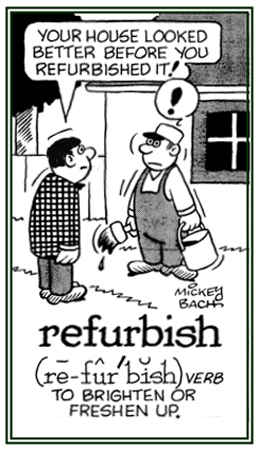
Go to this Word A Day Revisited Index
so you can see more of Mickey Bach's cartoons.
2. To give pleasure to others with food and drink: Joe and Joyce are regaling their friends with the best meal the special chef could prepare for them.
3. Etymology: from French regaler, "to give pleasure again" from re-, "again, back" + -gale, "pleasure, merriment."
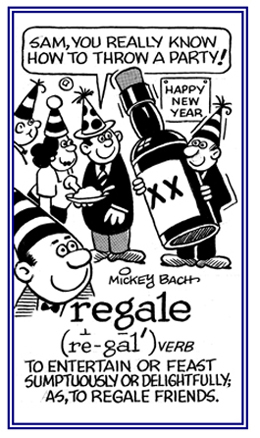
Go to this Word A Day Revisited Index
so you can see more of Mickey Bach's cartoons.
2. A place where many people go to spend time together to socialize: Nick planned to attend a rendezvous with his former business colleagues.

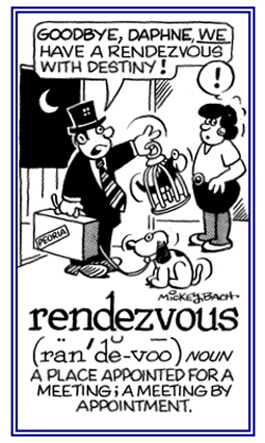
Go to this Word A Day Revisited Index
so you can see more of Mickey Bach's cartoons.
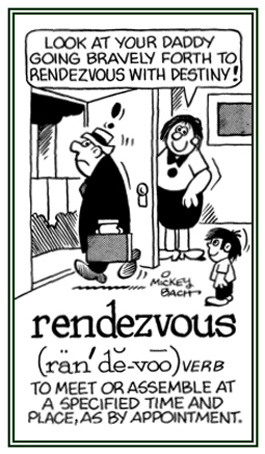
Go to this Word A Day Revisited Index
so you can see more of Mickey Bach's cartoons.
2. To stop participating in daily activities in order to go to bed at the end of the day in order to sleep: Glendora said, "I'm tired, so I will retire and go to bed now because my "nappetite" must be satisfied."
3. To leave a place, a position, or a way of life and to go to a place of less activity: The prominent surgeon decided to retire from his hospital work and to move to the country.
4. To stop a person or an animal from performing some activity because of illness or an inability to continue that activity: The manager decided to retire his prize winning race horse and to keep him for breeding purposes.
5. To take a machine or a piece of equipment out of service: The ancient harvester was finally retired and replaced by a diesel engine.
6. To fall back, or to move military troops away from a position, action, or danger: The command came from headquarters that the troops should be retired to the distant hills.
7. To end a baseball batter's or team's turn at bat by getting batters out: The baseball pitcher retired ten batters in a row.
8. To withdraw from a sports contest, or to withdraw someone from a sports contest, because of an inability to continue: The short stop was temporarily retired from the game due to his outrageous comments about his teammates.
9. To take a loan, a stock, a bond, or other financial instrument out of circulation by paying for it: Monroe retired his mortgage early and was pleased with his monthly savings.
10. To be bent or turned back: The shore retired to form a bay.
11. Etymology: from the mid 16th century (in the sense "to withdraw to a place of safety or seclusion"): from Middle French retirer, "to withdraw (something)" which comes from Latin re-, "back, again, against" + Old French tirer, "to draw".
The words retire and retiring come from French retirer, "pull back".
2. Living away from public view; withdrawn: The retired scientist kept up with current events by reading the blogs and tweets of his younger colleagues.
3. Withdrawn from business or an active life; usually, because of age: The elderly employee accepted his retired status, although there were times when he wished that he could continue to have a job.
Mark has a more retired life style now that he is on vacation.
The working staff is smaller now because of several retirements.
2. The period after a person has permanently stopped his or her job or profession: The staff wished her a long and happy retirement.3. Money which a person receives from a savings plan or a pension once he or she is no longer involved in a career nor working for a living: The family can live fairly well on the father's retirement.
Links to all of the groups of English words in action, Groups A to Z.
You may see the bibliographic list of sources of information for these words in action.


